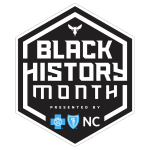Throughout the month of February, Hornets.com will be highlighting employees across different departments within the organization in celebration of Black History Month
Describe what you do with the Charlotte Hornets organization.
“I’m the General Manager and Head Coach of Hornets Venom GT, which is the organization’s E Sports affiliate with the NBA 2K League. Under my General Manager responsibilities, I’m responsible for building the roster, scouting new potential players and talent evaluation. I look at game skills, personality traits and consider how the players I currently have on the roster would mesh with new players.”
“Once the team is drafted, I throw on the coaching hat and manage the day-to-day activities like our practice schedule, making sure we’re sharp for the games, that everybody knows the plays, that everybody’s bringing certain energy, being motivated and being held to a high standard. I do whatever I can to bring the best out of the team.”
What experience(s) have had the most significant impact on your career in sports?
“I have a heavy background in coaching football, mostly at the youth level. I absolutely love working with the youth. At that level, the kids are raw, but the passion and talent are there. And being an innovator in the E Sports realm, we created our own league called the My Player Basketball Association (MPBA) before the NBA 2K League began. At the time, we were able to harness the best players in the world before they were really known. Those two things kind of drove me into this lane that I’m in now in E Sports.”
What does Black History Month mean to you?
“It means so much to me. Coming up in school, it gave us a chance to learn about our own history. As you get older, you started experiencing and learning more than what you did when you were in school. In school, they teach you about Martin Luther King Jr. and Rosa Parks. As you get older, you start learning about Nat Turner, Malcolm X and other people you don’t really talk too much about beforehand. Black History Month is a month solely about us. It’s a chance to learn about all the amazing things we’ve done in this country, a lot of which still goes unnoticed.”
How do you see yourself as a role model in the Black community?
“For me, I want to make an impact and the biggest way I can do that is dealing with the youth and getting a chance to mold them. Right now, I work with a lot of boys and do mentorships through football and different activities. I give them a positive role model and tell them they don’t have to sell drugs or live a street life in order to be successful. With sports, everybody can’t run fast, jump high or be 6-8. Not everybody is going to be a rapper. There have to be other outlets. I want them to expand their mind. You could be a doctor or go to school for any other thing. There’s a lot of successful people that aren’t famous. I’m just trying to be a positive figure in somebody’s life whether it’s picking them up from practice or dropping them off somewhere. Right now, I’m enrolled in mentorship for a military school, where I’m mentoring a teenager. I just make sure he’s staying on track and giving him somebody to talk to outside his parents who provides a different perspective. It gives me great pride to be a positive role model in the Black community and being a positive figure in these Black youth lives as well.”
Who are the most influential Black role models in your life?
“I would definitely say my mother, Mary Heath, and the guy who stepped in to help her out, Willie “Bubba” Stevenson. My father wasn’t around, but Willie was the guy I saw on a day-to-day basis. I watched his work ethic and how he was there to provide for his family. He kind of raised me as his own. He went to work every day, showed you how to be responsible with your money and made sure you took care of your family. I picked up my work ethic from him. My mother worked two or three jobs a day to just provide for me. I’m an only child and even to this day, whatever I need, she’s there for me. My mom is probably my biggest Black role model.”
“Outside of them, I have another guy in Coach Dedric Wise. When it comes to mentoring young Black boys and being a mentor in the community, nobody leads better by example than him. He sacrificed so much of his time to make sure that these kids experienced things that he wasn’t able to. A lot of the kids I work with have never left Rock Hill, let alone South Carolina. He showed them there’s things outside of the city. He really got me into divvying up my time to help the youth. Watching him and the respect that he gets from the kids has really impacted me. I have kids of my own, and I try and be the same great role model for other kids that I didn’t have growing up outside of my mom.”

